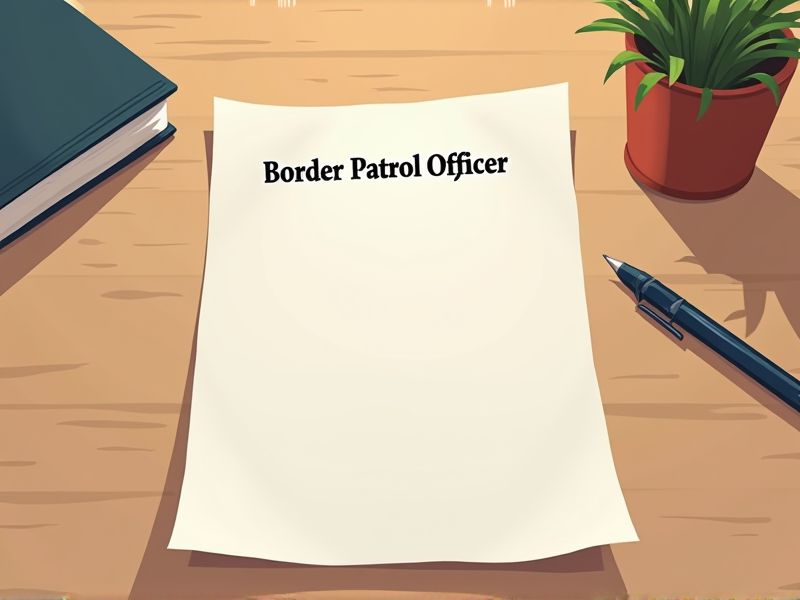
Border Patrol Officers operate in high-risk environments that demand specialized skills for both law enforcement and immigration responsibilities. Certifications ensure these officers possess the necessary training in areas like firearms proficiency, legal protocols, and emergency response. Such credentials enhance operational readiness and maintain compliance with federal standards. Here are some important certifications you may need as a Border Patrol Officer.
U.S. Customs and Border Protection (CBP) Academy Training Certification
The U.S. Customs and Border Protection (CBP) Academy Training Certification equips Border Patrol officers with essential skills for effective law enforcement. Without certification, students may lack understanding of immigration laws, patrolling techniques, and emergency response protocols, leading to potential security risks. Certification ensures officers are proficient in using advanced technology and equipment, crucial for maintaining border security. The rigorous training process reinforces ethical standards, ensuring officers conduct operations lawfully and with respect for human rights.
Federal Law Enforcement Training Center (FLETC) Certification
Border Patrol Officers need FLETC Certification to ensure they meet national law enforcement standards. This certification provides comprehensive training in legal, tactical, and operational skills crucial for effective border management. Accredited training reduces incidents of misconduct, enhancing public trust and officer safety. FLETC Certification also facilitates interoperability between agencies, streamlining joint operations.
Firearms Qualification Certification
Firearms Qualification Certification is necessary for Border Patrol Officers to ensure they are proficient in handling and using weapons safely, reducing the risk of accidental harm. Proficiency in firearms is crucial for effective threat response, given the unpredictable situations officers might face during border protection duties. Regular certification instills confidence in officers, enabling them to make split-second decisions in high-pressure environments. The requirement for certification reflects a commitment to maintaining public safety standards and upholding professional accountability for law enforcement personnel.
Defensive Tactics Certification
Defensive Tactics Certification equips Border Patrol Officers with necessary skills to effectively manage physical threats, reducing the risk of injury to officers and the public. Training in defensive tactics enhances decision-making under stress, improving response times in critical situations. The certification ensures officers adhere to legal standards, minimizing litigation risks related to use-of-force incidents. It provides a standardized approach to handling confrontations, promoting consistency and accountability within the agency.
Emergency Medical Technician (EMT) Certification
EMT certification equips Border Patrol Officers with the skills to provide critical medical assistance in remote areas. Many border regions lack immediate healthcare access, so officers must often act as first responders. Being EMT-certified enhances an officer's ability to stabilize individuals suffering from dehydration, injuries, or other medical emergencies commonly encountered. Such preparedness improves the overall safety and efficacy of border operations.
First Aid and CPR Certification
Border Patrol Officers often encounter emergency situations where they must stabilize individuals until professional medical help arrives, making First Aid and CPR certification crucial. This certification ensures they can provide immediate care to protect the health and safety of detained individuals and colleagues. The training equips officers with the skills needed to recognize life-threatening conditions, such as cardiac arrest or severe injuries, and respond accordingly. Certified officers can also potentially reduce the liability for the agency by acting within recognized life-saving protocols.
Crisis Intervention Team (CIT) Certification
The Crisis Intervention Team (CIT) Certification equips Border Patrol Officers with skills to de-escalate situations involving individuals with mental health issues, thereby reducing the occurrence of use-of-force incidents. Due to the challenging and unpredictable nature of border environments, officers frequently encounter migrants experiencing trauma and stress-related conditions. Receiving specialized training through CIT enhances the officers' ability to safely and effectively manage these encounters by fostering empathy and improving communication. This certification aligns with broader law enforcement goals of promoting public safety and protecting human rights at international borders.
Driver Training and Commercial Driver's License Certification
Driver Training and Commercial Driver's License Certification ensures that Border Patrol Officers possess the necessary skills to handle various vehicles, including commercial-grade ones used in patrolling. Effective vehicle operation enhances border security by enabling safe and efficient navigation through diverse terrains. This certification mitigates risks of accidents and equipment damage, leading to safer law enforcement operations. Proper training and certification also align with legal requirements, ensuring compliance with federal transportation and safety regulations.
Counterterrorism Certification
Counterterrorism Certification enhances a Border Patrol Officer's ability to identify potential terrorist threats, improving national security. It equips officers with specific skills to detect and prevent terrorist activities, reducing risk at borders. This training ensures officers stay updated with the latest counterterrorism strategies, increasing operational effectiveness. Certification aids in establishing international protocols, promoting collaboration with global security agencies.
Advanced Surveillance and Border Security Certification
The Advanced Surveillance and Border Security Certification equips Border Patrol Officers with cutting-edge technology knowledge, enabling them to effectively monitor and manage border areas. This certification emphasizes data analysis skills, which enhances the officers' ability to detect and respond to potential threats swiftly. In-depth understanding of evolving immigration laws provided by the certification ensures that officers conduct their duties within legal frameworks. Enhanced training in interpersonal communication helps in de-escalating potential conflicts, promoting safer interactions at the border.
Summary
When you see a border patrol officer with certifications, you can expect improved operational efficiency. These officers gain enhanced skills, which lead to better decision-making in high-stakes situations. The certification process often increases the officer's knowledge about laws and technology. This heightened expertise can contribute to more effective border security and public safety.
